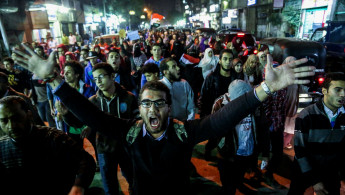UN: Egypt must hold security forces accountable for abuses
Egypt must rein in its security forces and investigate human rights abuses [External link: Amnesty International]against protesters, the United Nations said Tuesday, calling political tensions in the country "alarming".
Spokesman Rupert Colville said at least five people, including two security officers, had been reported killed in clashes during protests at the weekend.
The UN rights office said it was deeply concerned by "the seriously damaging lack of accountability for human rights violations committed by security forces in the context of demonstrations.", sSpokesman Rupert Colville said.
Islamists, and other groups have been protesting the military's overthrow of president Mohamed Morsi last year and also the dropping of murder charges against former president Hosni Mubarak who was accused of responsibility for the deaths of hundreds during the 2011 uprising that ended his three decades rule.
"The authorities must ensure that security forces do not resort to the excessive use of force," Colville told reporters in Geneva. "Prompt, thorough and independent investigations" should be carried out "into all human rights violations committed in the context of protests," he added.
He also urged protesters to act peacefully, saying "the increasing polarisation in Egyptian society is very alarming".
Protests by Islamists in Egypt are increasingly turning into armed attacks in response to a security crackdown that has resulted in hundreds of deaths and led to the jailing of thousands.
The UN rights office also criticised last week's conviction of around 80 students for illegal demonstrations and vandalism in protests backing Morsi.
"We urge the government to immediately release all those who have been detained for legitimate exercise of their rights to peaceful assembly and to freedom of association and expression," Colville said.
He also alluded to Saturday's court decision dropping the Mubarak murder charges.
"We are closely following attempts to bring to justice those responsible for serious human rights violations in Egypt, including the killings of hundreds of people in February 2011," he said.
Prosecutor to appeal verdict
Also on Tuesday, the office of Egypt's public prosecutor said it would appeal the court ruling that dropped a murder charge against ex-president Hosni Mubarak.
"The prosecutor general has decided to appeal," it said in a statement, after a Cairo court on Saturday ordered the dropping of murder and corruption charges against Mubarak, who ruled for three decades until being driven from office.
"The ruling was marred by a legal flaw," the prosecutor's office said, adding that its decision to appeal was "not influenced by disputes among political groups".
Mubarak is serving a three-year sentence in a separate graft case.
Seven of Mubarak's security commanders, including feared ex-interior minister Habib al-Adly, were acquitted on Saturday over the deaths of roughly 800 protesters during the 2011 revolt. Corruption charges against Mubarak's sons Alaa and Gamal were also dropped.
The Court of Cassation, the country's highest court, can now either confirm Saturday's ruling or decide to cancel it, in which case it would consider the case itself. An appeals court had previously overturned an initial life sentence for Mubarak in 2012 on a technicality, ordering the retrial that saw the charges dropped on Saturday.
Verdict sparks anger
His lawyer has said the 86-year-old could now see an early release from the military hospital where he is being held, as he has already served two-thirds of his sentence when time held in preliminary detention since his arrest in 2011 is taken into account.
After Saturday's verdict, more than 1,000 protesters gathered at an entrance to Cairo's Tahrir Square the epicentre of the anti-Mubarak revolt chanting slogans against the government of President Abdel Fattah al-Sisi.





 Follow the Middle East's top stories in English at The New Arab on Google News
Follow the Middle East's top stories in English at The New Arab on Google News
![Israeli forces ordered bombed Gaza's Jabalia, ordering residents to leave [Getty]](/sites/default/files/styles/image_330x185/public/2176418030.jpeg?h=a5f2f23a&itok=_YGZaP1z)

